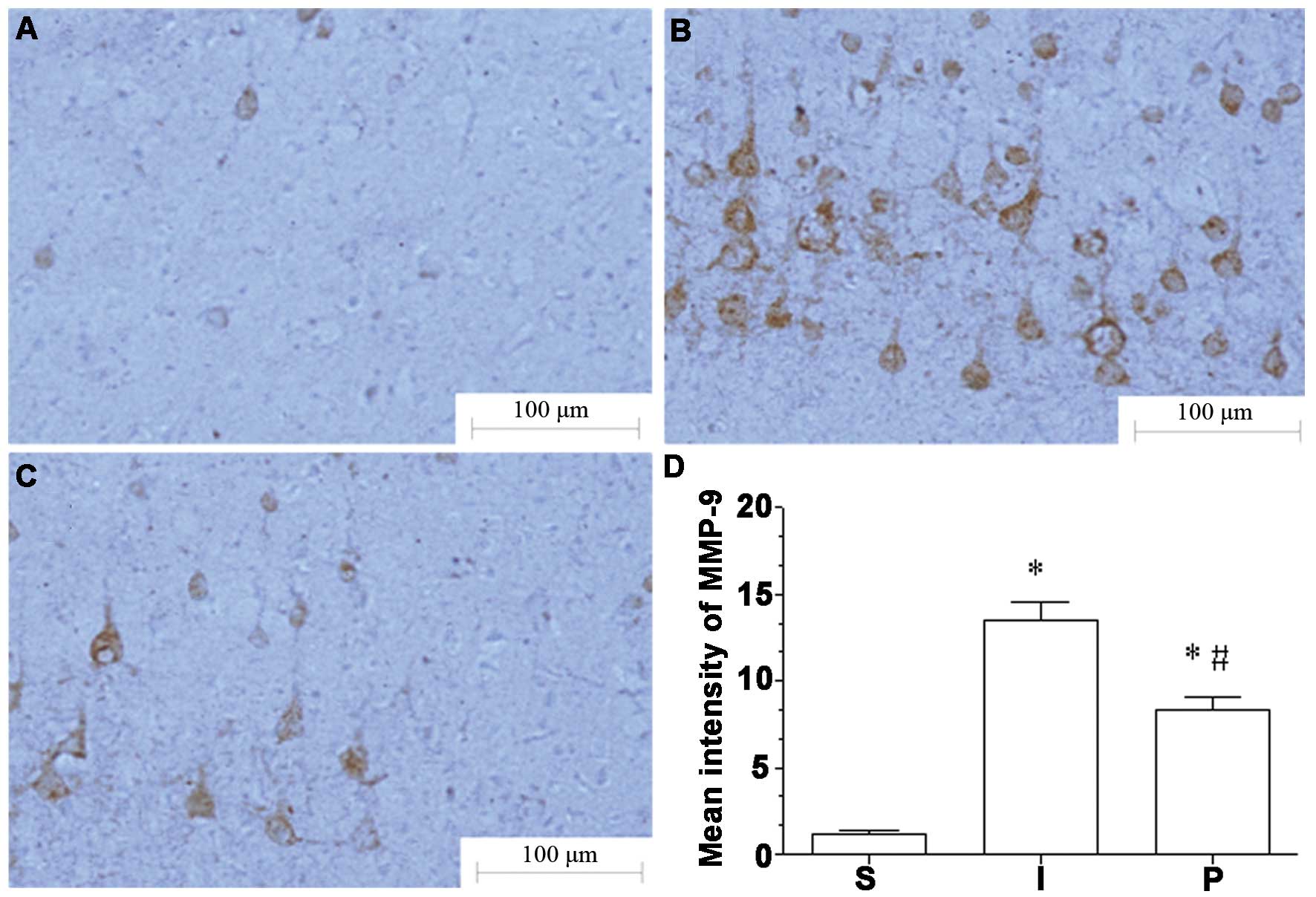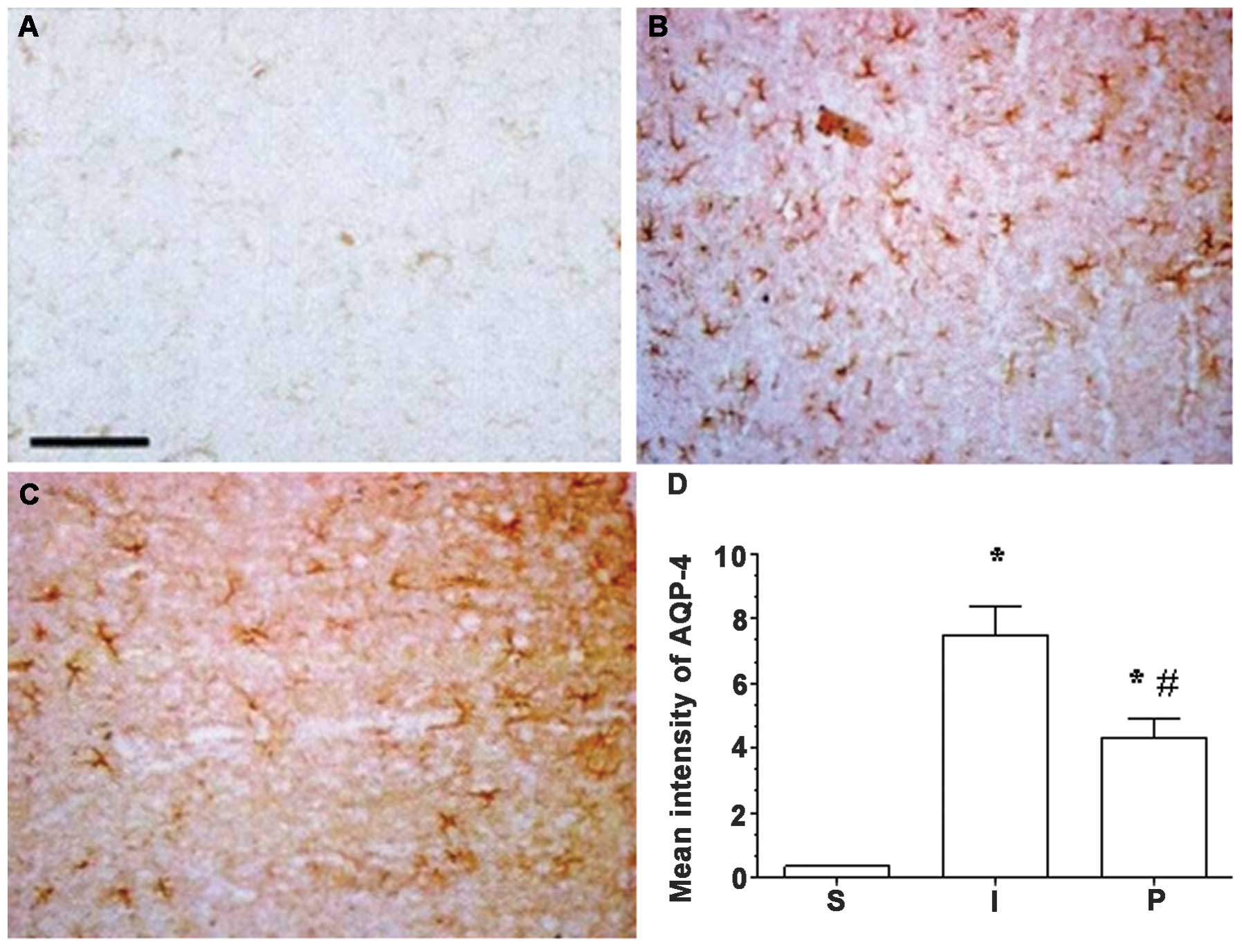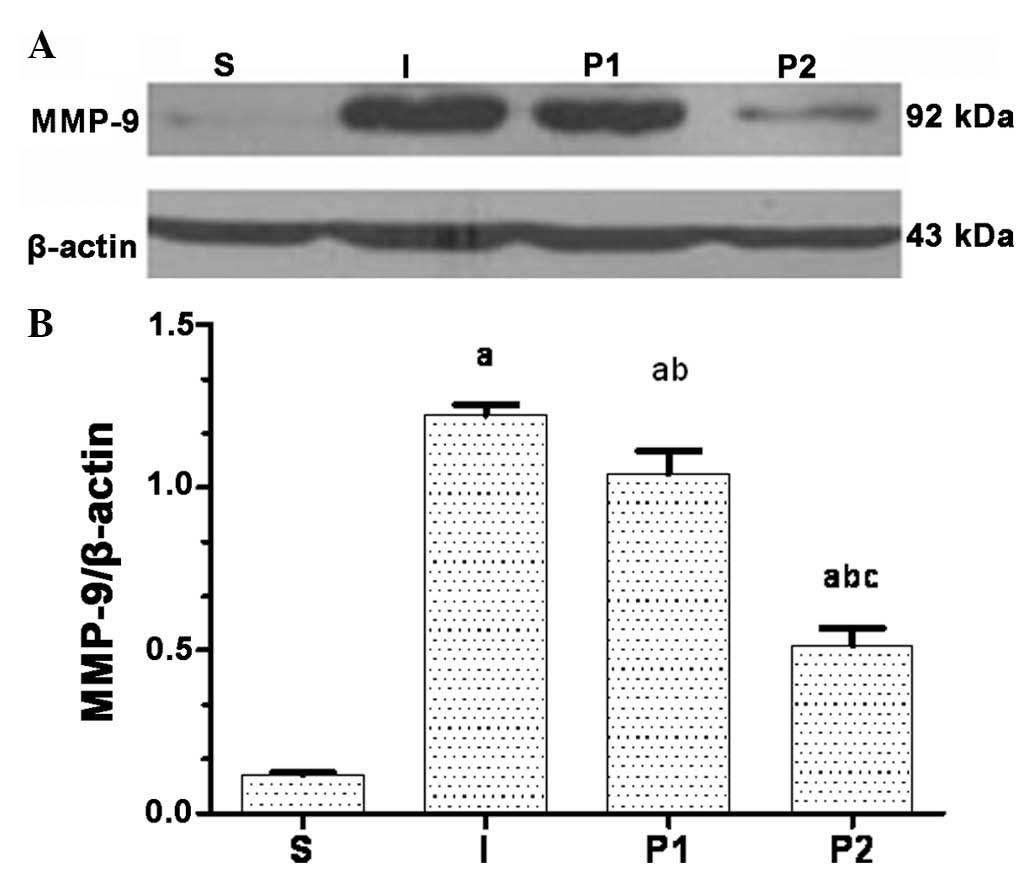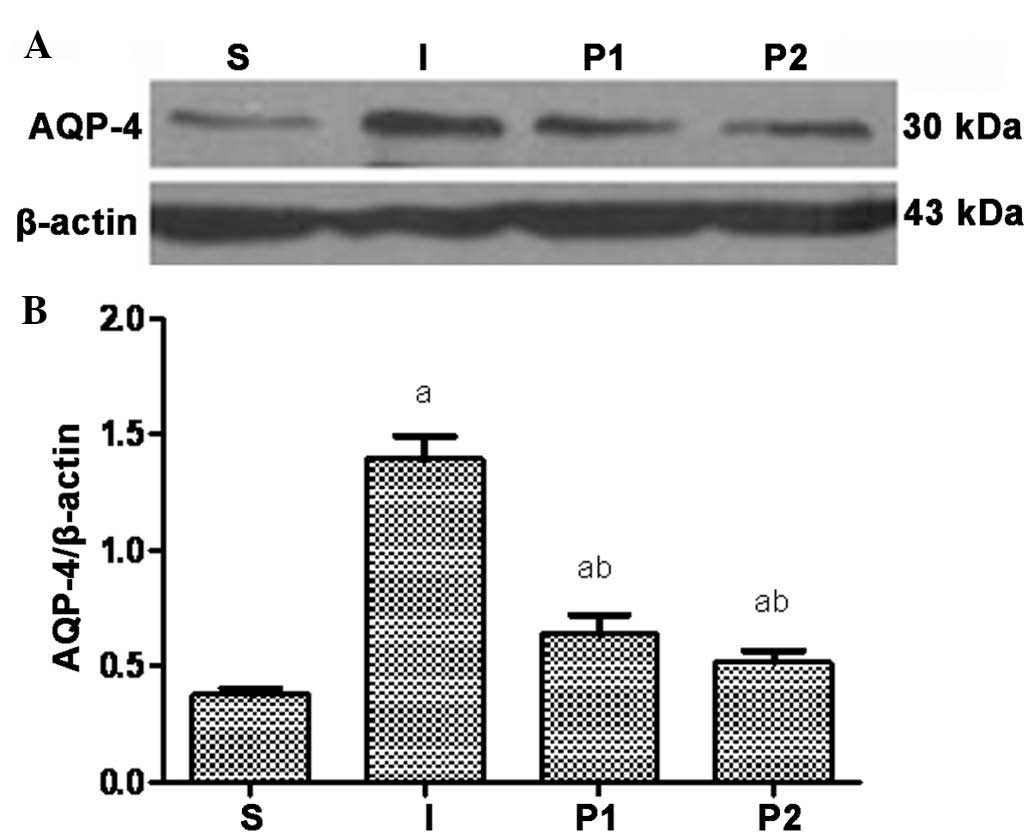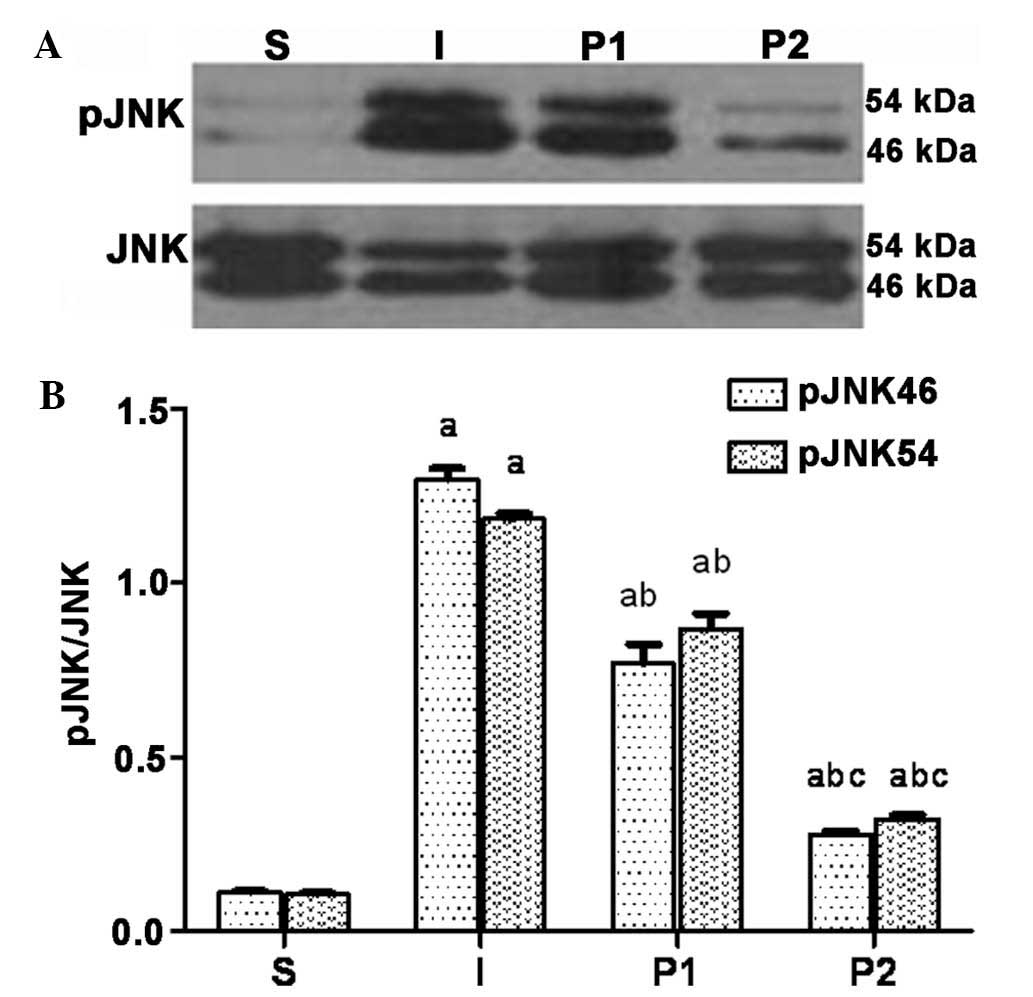|
1
|
Ginsberg MD: Role of free radical
reactions in ischaemic brain injury. Drug News Perspect. 14:81–88.
2001.
|
|
2
|
Pluta R: Pathological opening of the
blood-brain barrier to horseradish peroxidase and amyloid precursor
protein following ischemia-reperfusion brain injury. Chemotherapy.
51:223–226. 2005. View Article : Google Scholar : PubMed/NCBI
|
|
3
|
Tu XK, Yang WZ, Shi SS, et al:
5-lipoxygenase inhibitor zileuton attenuates ischaemic brain
damage: involvement of matrix metalloproteinase 9. Neurol Res.
31:848–852. 2009. View Article : Google Scholar : PubMed/NCBI
|
|
4
|
Papadopoulos MC and Verkman AS:
Aquaporin-4 and brain edema. Pediatr Nephrol. 22:778–784. 2007.
View Article : Google Scholar : PubMed/NCBI
|
|
5
|
Vikman P, Ansar S, Henriksson M, et al:
Cerebral ischemia induces transcription of inflammatory and
extracellular-matrix-related genes in rat cerebral arteries. Exp
Brain Res. 183:499–510. 2007. View Article : Google Scholar : PubMed/NCBI
|
|
6
|
Yatsushige H, Ostrowski RP, Tsubokawa T,
et al: Role of c-jun N-terminal kinase in early brain injury after
subarachnoid hemorrhage. J Neurosci Res. 85:1436–1448. 2007.
View Article : Google Scholar : PubMed/NCBI
|
|
7
|
Engelhard K, Werner C, Eberspächer E, et
al: Influence of propofol on neuronal damage and apoptotic factors
after incomplete cerebral ischemia and reperfusion in rats: a
long-term observation. Anesthesiology. 101:912–917. 2004.
View Article : Google Scholar : PubMed/NCBI
|
|
8
|
Wang H, Luo M, Li C and Wang G: Propofol
post-conditioning induced long-term neuroprotection and reduced
internalization of AMPAR GluR2 subunit in a rat model of focal
cerebral ischemia/reperfusion. J Neurochem. 119:210–219. 2011.
View Article : Google Scholar : PubMed/NCBI
|
|
9
|
Wang HY, Wang GL, Yu YH and Wang Y: The
role of phosphoinositide-3-kinase/Akt pathway in propofol-induced
postconditioning against focal cerebral ischemia-reperfusion injury
in rats. Brain Res. 1297:177–184. 2009. View Article : Google Scholar : PubMed/NCBI
|
|
10
|
Xing B, Chen H, Zhang M, et al: Ischaemic
post-conditioning protects brain and reduces inflammation in a rat
model of focal cerebral ischemia/reperfusion. J Neurochem.
105:1737–1745. 2008. View Article : Google Scholar : PubMed/NCBI
|
|
11
|
Longa EZ, Weinstein PR, Carlson S and
Cummins R: Reversible middle cerebral artery occlusion without
craniotomy in rats. Stroke. 20:84–91. 1989. View Article : Google Scholar : PubMed/NCBI
|
|
12
|
Uyama O, Okamura N, Yanase M, et al:
Quantitative evaluation of vascular permeability in the gerbil
brain after transient ischemia using Evans blue fluorescence. J
Cereb Blood Flow Metab. 8:282–284. 1988. View Article : Google Scholar : PubMed/NCBI
|
|
13
|
Zador Z, Stiver S, Wang V and Manley G:
Role of aquaporin-4 in cerebral edema and stroke. Handb Exp
Pharmacol. 190:159–170. 2009.
|
|
14
|
Ho JD, Yeh R, Sandstrom A, et al: Crystal
structure of human aquaporin 4 at 1.8 A and its mechanism of
conductance. Proc Natl Acad Sci USA. 106:7437–7442. 2009.
View Article : Google Scholar : PubMed/NCBI
|
|
15
|
Manley GT, Fujimura M, Ma T, et al:
Aquaporin-4 deletion in mice reduces brain edema after acute water
intoxication and ischaemic stroke. Nat Med. 6:159–163. 2000.
View Article : Google Scholar : PubMed/NCBI
|
|
16
|
Heo JH, Lucero J, Abumiya T, Koziol JA,
Copeland BR and del Zoppo GJ: Matrix metalloproteinases increase
very early during experimental focal cerebral ischemia. J Cereb
Blood Flow Metab. 19:624–633. 2009.
|
|
17
|
Barr TL, Latour LL, Lee KY, et al:
Blood-brain barrier disruption in humans is independently
associated with increased matrix metalloproteinase-9. Stroke.
41:e123–e128. 2010. View Article : Google Scholar
|
|
18
|
Lee K, Lee JS, Jang HJ, et al: Chlorogenic
acid ameliorates brain damage and edema by inhibiting matrix
metalloproteinase-2 and 9 in a rat model of focal cerebral
ischemia. Eur J Pharmacol. 689:89–95. 2012. View Article : Google Scholar : PubMed/NCBI
|
|
19
|
Hartz AM, Bauer B, Soldner EL, et al:
Amyloid-β contributes to blood-brain barrier leakage in transgenic
human amyloid precursor protein mice and in humans with cerebral
amyloid angiopathy. Stroke. 43:514–523. 2012. View Article : Google Scholar
|
|
20
|
Wang Z, Meng CJ, Shen XM, et al: Potential
contribution of hypoxia-inducible factor-1α, aquaporin-4, and
matrix metalloproteinase-9 to blood-brain barrier disruption and
brain edema after experimental subarachnoid hemorrhage. J Mol
Neurosci. 48:273–280. 2012. View Article : Google Scholar : PubMed/NCBI
|
|
21
|
Igarashi H, Huber VJ, Tsujita M and Nakada
T: Pretreatment with a novel aquaporin 4 inhibitor, TGN-020,
significantly reduces ischaemic cerebral edema. Neurol Sci.
32:113–116. 2011. View Article : Google Scholar :
|
|
22
|
Hu Q, Chen C, Khatibi NH, et al:
Lentivirus-mediated transfer of MMP-9 shRNA provides
neuroprotection following focal ischaemic brain injury in rats.
Brain Res. 1367:347–359. 2011. View Article : Google Scholar
|
|
23
|
Wang Z, Leng Y, Tsai LK, et al: Valproic
acid attenuates blood-brain barrier disruption in a rat model of
transient focal cerebral ischemia: the roles of HDAC and MMP-9
inhibition. J Cereb Blood Flow Metab. 31:52–57. 2011. View Article : Google Scholar :
|
|
24
|
Zhu SM, Xiong XX, Zheng YY and Pan CF:
Propofol inhibits aquaporin 4 expression through a protein kinase
C-dependent pathway in an astrocyte model of cerebral
ischemia/reoxygenation. Anesth Analg. 109:1493–1499. 2009.
View Article : Google Scholar : PubMed/NCBI
|
|
25
|
Deegan CA, Murray D, Doran P, et al:
Anesthetic technique and the cytokine and matrix metalloproteinase
response to primary breast cancer surgery. Reg Anesth Pain Med.
35:490–495. 2010. View Article : Google Scholar : PubMed/NCBI
|
|
26
|
Chang L and Karin M: Mammalian MAP kinase
signalling cascades. Nature. 410:37–40. 2001. View Article : Google Scholar : PubMed/NCBI
|
|
27
|
Tripathi A and Sodhi A: Growth
hormone-induced production of cytokines in murine peritoneal
macrophages in vitro: role of JAK/STAT, PI3K, PKC and MAP kinases.
Immuno Biology. 214:430–440. 2009. View Article : Google Scholar
|
|
28
|
Park HS, Huh SH, Kim MS, et al: Nitric
oxide negatively regulates c-jun N-terminal kinase/stress-activated
protein kinase by means of S-nitrosylation. Proc Natl Acad Sci USA.
97:14382–14387. 2000. View Article : Google Scholar : PubMed/NCBI
|
|
29
|
Zeng XW, Li MW, Pan J, et al: Activation
of c-jun N-terminal kinase 1/2 regulated by nitric oxide is
associated with neuronal survival in hippocampal neurons in a rat
model of ischemia. Chin Med J (Engl). 124:3367–3372. 2011.
|
|
30
|
Murata Y, Fujiwara N, Seo JH, et al:
Delayed inhibition of c-jun N-terminal kinase worsens outcomes
after focal cerebral ischemia. J Neurosci. 32:8112–8115. 2012.
View Article : Google Scholar : PubMed/NCBI
|
|
31
|
Shu L, Li T, Han S, et al: Inhibition of
neuron-specific CREB dephosphorylation is involved in propofol and
ketamine-induced neuroprotection against cerebral ischaemic
injuries of mice. Neurochem Res. 37:49–58. 2012. View Article : Google Scholar
|
|
32
|
De La Cruz JP, Villalobos MA, Sedeno G, et
al: Effect of propofol on oxidative stress in an in vitro model of
anoxia-reoxygenation in the rat brain. Brain Res. 800:136–144.
1998. View Article : Google Scholar : PubMed/NCBI
|
|
33
|
Shibata H, Katsuki H, Okawara M, et al:
c-jun N-terminal kinase inhibition and alpha-tocopherol protect
midbrain dopaminergic neurons from
interferon-gamma/lipopolysaccharide-induced injury without
affecting nitric oxide production. J Neurosci Res. 83:102–109.
2006. View Article : Google Scholar
|
|
34
|
Corcoran TB, Engel A, Sakamoto H, et al:
The effects of propofol on neutrophil function, lipid peroxidation
and inflammatory response during elective coronary artery bypass
grafting in patients with impaired ventricular function. Br J
Anaesth. 97:825–831. 2006. View Article : Google Scholar : PubMed/NCBI
|
|
35
|
Ouyang YB, Voloboueva LA, Xu LJ and
Giffard RG: Selective dysfunction of hippocampal CA1 astrocytes
contributes to delayed neuronal damage after transient forebrain
ischemia. J Neurosci. 27:4253–4260. 2007. View Article : Google Scholar : PubMed/NCBI
|















